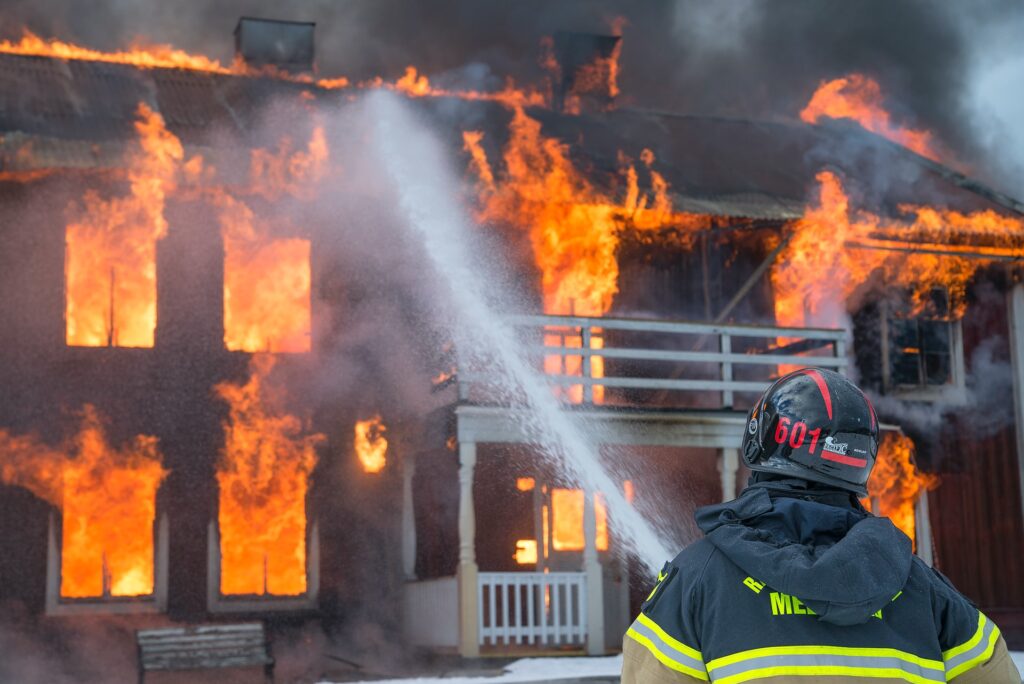How Rental Property Insurance Can Protect Your Investment

Imagine for a second that your rental property catches on fire. Not only do you have the financial burden of repairing or rebuilding the property, but you also have to find a new place for your tenants to live.
While rental property insurance can’t protect against all possible disasters, it can help protect you from some of the biggest ones. Here’s what you need to know about rental property insurance and why it’s important for landlords and property managers.
The Benefits of Rental Property Insurance
As a landlord, you know that protecting your rental property is essential. Not only does it safeguard your investment, but it also provides peace of mind in case of accidents or damage.
Rental property insurance is one way to help protect your property and your tenants. This type of insurance can help to cover the cost of repairs in the event of fire, theft, or vandalism. It can also help to cover the cost of legal liability if a tenant is injured on the property.
In addition, rental property insurance can provide protection in the event of natural disasters such as floods or earthquakes. by investing in rental property insurance, you can help to protect your property and your tenants.
How To Choose the Right Policy for Your Needs
There are many types of rental property insurance policies available, and it can be difficult to determine which one is right for your needs. The most important thing to remember is that your policy should cover the dwelling itself, as well as any liability risks associated with renting it out.
There are two main types of landlord insurance policies: dwelling coverage and liability coverage. Dwelling coverage protects the physical structure of your rental property, while liability coverage protects you from potential lawsuits stemming from accidents or injuries that occur on your property.
To choose the right policy for your needs, it’s important to assess the risks associated with your rental property. If you live in an area with a high crime rate, for example, you may want to purchase a policy with higher liability limits. If your property is located in a flood zone, you’ll need to make sure your policy includes coverage for water damage.
Once you’ve determined the risks associated with your rental property, you can compare policies from different insurers to find the one that best meets your needs. Be sure to read the fine print carefully, as some policies have exclusions or limits that could leave you without coverage when you need it most.
By following these best practices, you can choose the right rental property insurance policy for your needs and protect your investment.
Where To Find Rental Property Insurance

There are a few different places that a landlord can find rental property insurance. The most common place to look is through an insurance agent or broker. There are also a few companies that specialize in rental property insurance.
The biggest advantage of using an insurance agent or broker is that they will be able to shop around for the best coverage and price. They will also be familiar with the different coverages that are available and can help tailor a policy to the specific needs of the landlord.
The downside of using an insurance agent or broker is that they may not have as much experience with rental properties as some of the specialized companies. They may also charge a higher commission for their services.
There are a few companies that specialize in rental property insurance. These companies usually have more experience with rental properties and may be able to offer better coverage at a lower price. The downside of using a specialized company is that they may not be familiar with the local market conditions.
The best way to find the right rental property insurance is to talk to a few different agents or brokers and get quotes from several different companies. This will allow the landlord to compare rates and coverage levels and choose the policy that is best for their needs.
What To Do if You Need To File a Claim
If you’re a landlord with rental property insurance, it’s important to know what to do if you need to file a claim. Here are the general steps involved in filing an insurance claim:
- Contact your insurance company or agent as soon as possible after the loss occurs.
- The insurance company will send an adjuster to inspect the damage and determine the extent of coverage.
- The insurance company will issue a payment based on the policy limits and the amount of damage incurred.
- The landlord will use the funds to repair or replace the damaged property.
If you follow these steps, you should be able to successfully file an insurance claim and receive the compensation you’re entitled to.
How To Reduce Your Risk as a Landlord
As a landlord, you want to do everything you can to protect your rental property and avoid having to file an insurance claim. There are some simple things you can do to reduce risk and help keep your property safe.
First, make sure your rental unit is up to code and meets all safety requirements. This will help reduce the likelihood of an accident occurring on the property.
Next, screen all potential tenants carefully. Be sure to check references and run a background check. You want to make sure you are renting to responsible, trustworthy tenants who will take care of your property.
Another way to reduce risk is to have a solid lease agreement in place. This document should outline the expectations and responsibilities of both the landlord and tenant. Be sure to go over the lease agreement with your tenants before they move in, so there are no misunderstandings.
Finally, keep your rental property well-maintained. This means regularly inspecting the unit, making repairs as needed, and keeping the common areas clean and tidy. By taking these simple steps, you can help reduce the risk of an accident or damage occurring on your rental property.
Rental property insurance can help protect your investment in case of an accident or damage. But by taking some preventive measures, you can help reduce the likelihood that you will need to file a claim.
Why Tenant Screening Is Critical

You want to be sure that you are renting your property to responsible tenants who will take care of your investment. tenant screening is critical in order to help ensure this. tenant screening can help give you peace of mind and protect your investment.
Benefits of tenant screening
- Allowing you to get to know your tenant better – You can learn about their rental history, employment situation, and other important factors that will help you determine if they are a good fit for your property.
- Helping you avoid problem tenants – Problem tenants can cause damage to your property, miss rent payments, and create other problems. By screening tenants thoroughly, you can help avoid these issues.
- Giving you peace of mind – When you know that you have screened your tenant carefully, you can feel more confident and secure in your decision to rent to them.
How tenant screening works
The tenant screening process usually includes the following steps:
- Obtaining a credit report – This will give you information on the tenant’s financial history and can help you determine their ability to pay rent on time.
- Checking employment records – You’ll want to verify that the tenant is employed and has a steady income.
- Running a background check – A background check can reveal important information about the tenant, such as any criminal history.
- Contacting references – talking to the tenant’s references can give you insights into what it would be like to rent to them.
Tips for Maintaining Your Rental Property

1. Keep the property clean – A clean rental property is more likely to attract quality tenants and will help you keep your rental rates competitive. Be sure to regularly sweep, mop, and vacuum all common areas and units.
2. Perform regular maintenance – By keeping up with routine maintenance, you can avoid more costly repairs down the road. Regularly check and replace air filters, smoke detectors, and carbon monoxide detectors.
3. Inspect the property – It’s important to inspect your rental property on a regular basis in order to identify any potential problems early on. Be sure to check for any water damage, structural issues, pests, or other hazards.
4. Keep up with landscaping – First impressions matter, so be sure to keep the landscaping on your rental property well-maintained. Regularly mow the lawn, trim the hedges, and remove any dead leaves or debris.
5. Repair any damage quickly – If there is any damage to the rental property, be sure to repair it as soon as possible. This will show your tenants that you are committed to maintaining a safe and comfortable environment for them.
6. Hire a professional property management company – If you’re not able to manage the rental property yourself, be sure to hire a professional property management company. They will be able to take care of all the details for you, so you can relax and enjoy the rental income.
Closing Thoughts

Rental property insurance is a must for any landlord.
It can help protect your investment and keep you from having to out of pocket for repairs or damages. Tenant screening is also important, as it can help you avoid potential problems down the road.
By taking the time to screen tenants carefully, you can help protect your investment and rental property. Finally, remember to keep up with routine maintenance and repairs in order to avoid more costly problems in the future.
Would You Like To Publish a Free Blog Post on This Site?
Are you a real estate professional, property manager, or industry expert with valuable insights to share? We welcome guest contributors who can provide unique perspectives and actionable advice for our community of property investors and managers.
Guest posting is an excellent way to share your expertise while building backlinks and connecting with our engaged audience of real estate investors and professionals. Best of all, there’s no charge to publish your post on our site!

Discover the secret to stress-free property management with How To Find & Keep Great Tenants. This essential guide reveals proven strategies for attracting high-quality renters and creating long-term, mutually beneficial relationships.
But finding great tenants is only half the battle. Uncover the art of tenant retention, from creating a positive living environment to addressing concerns promptly and professionally.
With this book, you’ll transform your rental property into a sought-after home that tenants won’t want to leave. Minimize vacancies, reduce turnover costs, and maximize your investment’s potential by mastering the skills to find and keep exceptional tenants.
Get your copy now from your favorite bookseller:
- Amazon (non-Premium Edition, does not include Investment Real Estate Analysis: A Case Study, available in paperback only)
- Books2Read for Apple, Barnes & Noble, Kobo, Scribed, and 8 more sellers with both eBook and paperback options available (Premium Edition)
- Payhip as a downloadable PDF (Premium Edition)
Ready to take your business to the next level?
- Subscribe to our newsletter
- Visit the learning center
- Learn more about our consulting services
Blog post created by J. Scott Digital freelance copywriting services.
